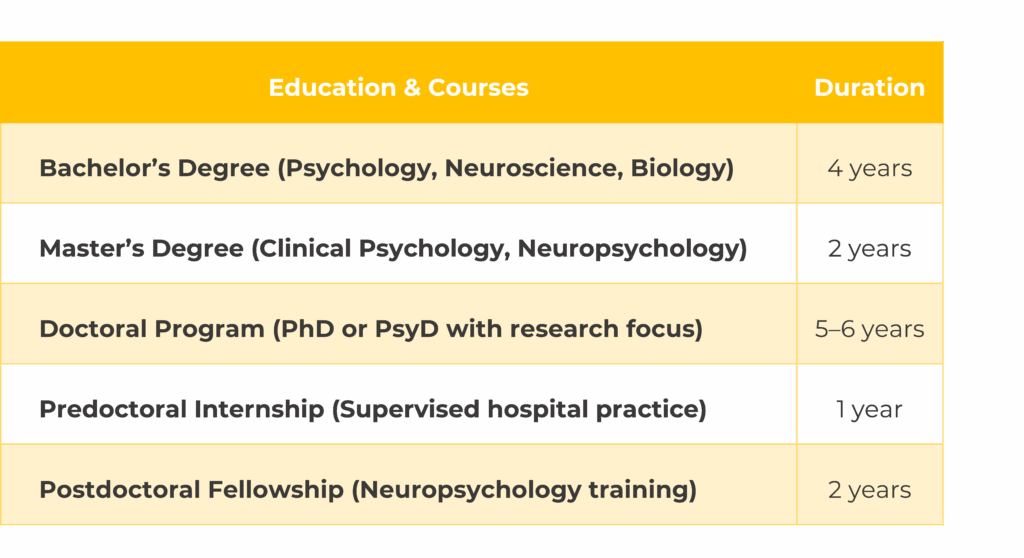The human brain processes 11 million bits of information per second, yet we consciously perceive only 40-50. For the students who find this organ and its effect on behaviour fascinating, neuropsychology courses provide a means of entry into one of the most exciting branches of science. As one of the psychology courses that explore human behaviour, it examines the influence of the form and functioning of the brain on thinking, emotions, and behaviour. Have you ever wondered how brain injuries alter personality or why some people recover more easily than others following a stroke? Neuropsychology courses can help turn that curiosity into a career.
What Is Neuropsychology?
Neuropsychology combines neuroscience and psychology by investigating how brain changes affect thinking, emotions, and actions.
Fun Fact About Neuropsychology – During World War II, physicians observed a sudden memory loss, mood change, or personality change in soldiers with head injuries. These puzzling symptoms resulted in the increased exploration of the brain, which served as the foundation of what we refer to as neuropsychology today.
Neuropsychologists, what do they do varies by specialisation. In hospitals, they evaluate patients with strokes and develop treatment strategies. In rehabilitation centers, they offer cognitive therapies and family education in the rehabilitation centers. Research neuropsychologists conduct research and analyse data, while forensic professionals provide a legal opinion and present findings in a courtroom.
What Does It Take to Be a Neuropsychologist?
As a neuropsychologist, you must possess both technical and people-connection skills, which will allow you to positively communicate with patients with cognitive challenges:
- Analytical Skills: You will interpolate test results, brain-behavioural interactions, and provide precise diagnostic inferences with neuropsychological measures.
- Patient Empathy: When attending to patients and some people who are victims of brain injuries, stroke, or a degenerative disease, you must be very compassionate and emotionally supportive during difficult times.
- Clear Communication: You should be able to explain complex neurological concepts that patients, their families, and medical teams can interpret and follow through.
- Continuous Learning: The profession is continuously evolving, and new studies on the functioning of the brain, evaluation methods, and treatment procedures demand constant learning throughout your professional life.
The occupation involves basic science education as well as the interaction abilities necessary to assist individuals in overcoming mental challenges.
How Many Years to Become a Neuropsychologist?
In order to become a neuropsychologist in India, students normally undergo certain academic courses and clinical training at several levels. Here’s a breakdown of the common path:
How to Become a Neuropsychologist After 12th
Start with careful undergraduate planning. Major in psychology to be best equipped, but neuroscience, biology, and cognitive science also prepare students well. Keep up good grades because most graduate programmes have a minimum GPA requirement of 3.5. Get research experience through faculty research projects and volunteer in hospitals and rehabilitation centres.
Specialization Pathways
If you intend to pursue a specialised field within neuropsychology, your career choice will be guided by the area of work you like to be in.
How to Become a Clinical Neuropsychologist?
Begin with a PhD in clinical psychology at an institute recognised by RCI or UGC with a special focus on neuropsychology. Get a competitive internship at a medical or rehabilitation centre, and then a postdoctoral fellowship that provides hands-on clinical experience with neurological patients.
How to Become a Forensic Neuropsychologist?
Integrate legal expertise into neuropsychology practice. Take some classes in law procedures, ethics, and forensic assessments. Develop courtroom experience through expert witness preparation and develop networks in legal and correctional systems.
How Much Does It Cost to Become a Neuropsychologist
The overall expense greatly depends on where and how you undertake your education. In India, becoming a neuropsychologist typically costs between ₹50,000–₹180,000. The cost of studying abroad is higher, including the general costs of study like fees, accommodation, and certification costs.
If your concern is “How can I become a neuropsychologist affordably?, you can reduce the financial burden by:
- Applying for research assistantships that offer tuition waivers and stipends.
- Looking for merit-based scholarships from universities or private foundations.
- Working part-time in university research labs or clinical centres to gain both income and experience.
Best Neuropsychology Courses in India
So, what degree do you need for neuropsychology? In many Indian universities, neuropsychology as a profession does not begin with a direct undergraduate course. Rather, students enter with a B.Sc. (or B.A.) in Psychology, a master degree (MS) in either Neuropsychology or Clinical Psychology, and may go on and obtain a doctorate degree.
Nevertheless, there are now undergraduate programmes of a more focused nature associated with behavioural and neuropsychology being offered in some universities. Here are the best neuropsychology colleges in India providing relevant programmes across undergraduate, postgraduate, and doctoral levels:
What Can You Do With a Neuropsychology Degree
Neuropsychology career opportunities cut across various fields with a rising demand. Clinical practice specializations include University departments provide research opportunities to explore the links between the brain and behaviour, and new technology industries require individuals to create neuropsychological applications, AI, and virtual reality therapy. Forensic neuropsychology offers positions such as criminal competency examinations, personal injury examinations, and expert witnessing.
University departments provide research opportunities to explore the links between the brain and behaviour, and new technology industries require individuals to create neuropsychological applications, AI, and virtual reality therapy. Forensic neuropsychology offers positions such as criminal competency examinations, personal injury examinations, and expert witnessing.
Conclusion
How to get into neuropsychology requires strategic planning from high school through graduate training. Students should concentrate on brain study through biology and psychology courses, work on very good academic records, and also gain clinical exposure via volunteering. The degree path of neuropsychology offers enriching experiences in assisting patients as well as advancing brain science. The rising growth of the healthcare industry in India and the emerging international research partnerships make neuropsychology a field with great future potential.
Interested in Neuropsychology? Begin by taking Mindler’s 5-dimensional career assessment to determine if neuropsychology fits in with your own strengths and interests.
FAQs
What is the scope of neuropsychology courses in India?
In India, neuropsychology is gaining momentum with rising dementia and stroke cases, increased mental health awareness, and initiatives like the National Mental Health Program. Private hospitals are also hiring specialised neuropsychologists to offer integrated brain health services.
How long does it take to become a neuropsychologist in India?
Complete timeline includes a 3-4 year bachelor’s degree in psychology, 2 years master’s in clinical psychology, 2 years M.Phil with clinical training, and 3-5 years Ph.D. with advanced research, totaling 10-13 years from undergraduate studies.
Is a neuropsychology degree enough for mental health careers?
Career scope depends on education level. Master’s/M. Phil graduates can work as psychological associates under supervision, doctoral level enables independent neuropsychological assessment practice, while broader mental health work may require additional counselling certifications and interdisciplinary collaboration.
How to get into neuropsychology from non-psychology backgrounds?
Career changers can pursue bridge programmes at universities, complete prerequisite psychology and statistics courses, apply to master’s programmes designed for diverse backgrounds, gain clinical exposure through volunteering, and attend professional workshops to build knowledge networks.










